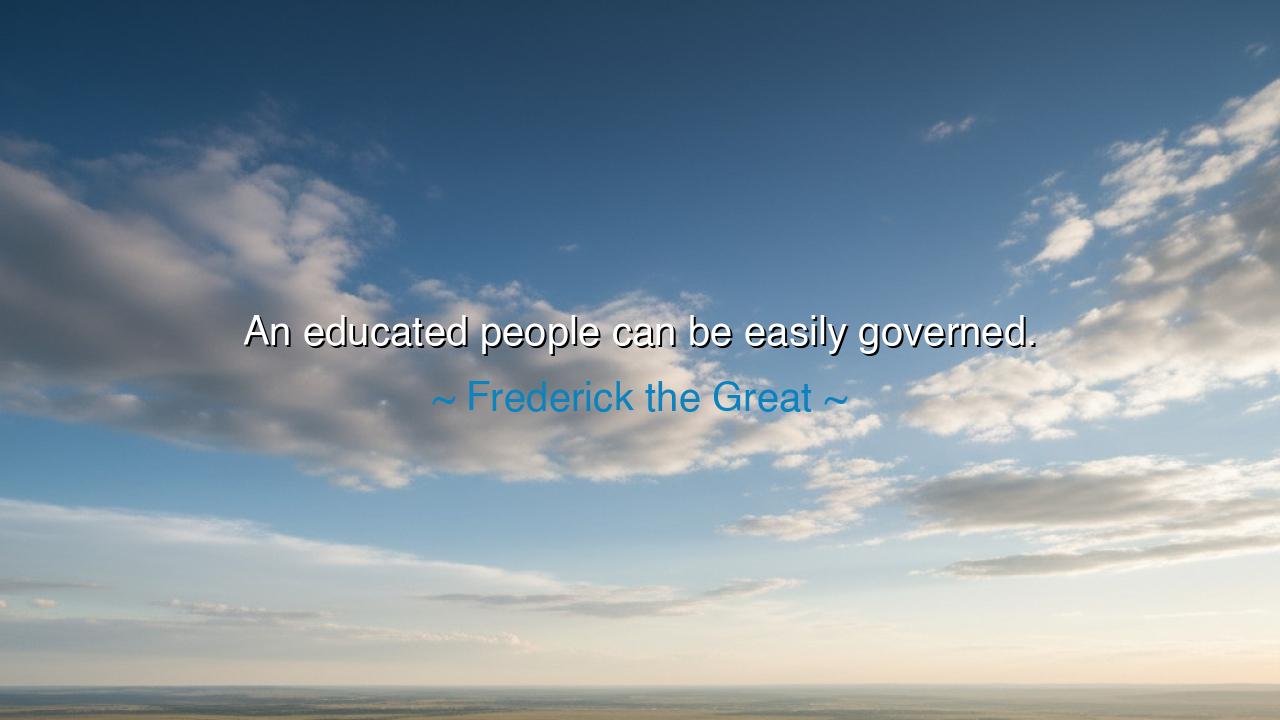
An educated people can be easily governed.






“An educated people can be easily governed.” So declared Frederick the Great, the enlightened monarch of Prussia — a warrior, a philosopher, and one of the most brilliant rulers of his age. Yet his words, though simple, carry the weight of both wisdom and warning. For education is a double-edged sword: it can make a people wise and harmonious, or docile and controlled, depending on the spirit in which it is given. Frederick, who sought to shape his kingdom through reason and reform, understood that a populace trained in knowledge, discipline, and understanding would not rebel against wisdom but cooperate with it. He saw that ignorance breeds chaos, but education, when properly guided, breeds order.
In the ancient days, the philosophers of Greece spoke of the same truth, though with different tones. Plato, in his Republic, wrote that education must shape not only the mind but the soul — that only those who understood justice could live under it. To educate a people, then, is to make them capable of governing themselves, and through this self-governance, the ruler’s task becomes lighter. Frederick knew this well. He ruled not by cruelty, but by intellect. He believed that the more his subjects understood duty, morality, and civic reason, the less they would need the harsh hand of law. In his words, education was the foundation not of tyranny, but of enlightened rule.
Yet there is also a deeper current beneath his saying, one that stirs uneasily in the hearts of those who think. For though education frees the mind, it can also bind it if misused. A people taught only what to think — not how to think — may become obedient but not wise. They will follow, not question. Thus, the ruler who controls education controls the very spirit of the nation. Frederick the Great, though a man of reason, understood this paradox. He established schools across his realm, but he also ensured they taught loyalty to the state. His intent was not oppression, but stability — yet history reminds us how easily knowledge, when shaped by power, becomes a tool of subtle control.
Consider the story of Napoleon Bonaparte, who rose from the ashes of revolution to lead France. Like Frederick, he admired learning and built institutions to educate the young. But he was not blind to its power. “I want to mold an education that will make good soldiers,” he once said. He knew that to guide a people’s minds is to shape their destiny. Under his hand, schools became instruments of statecraft. Children were taught not only arithmetic and letters, but obedience, patriotism, and reverence for the Emperor. Thus, education, though noble in form, became the quiet architect of unity — and of control. It was not forced chains that bound France, but the gentle threads of ideology woven through the classroom.
Frederick’s quote, then, stands as both a vision and a caution. He envisioned a society where educated citizens would act with wisdom, where reason would guide conduct, and where peace would be maintained not by fear but by understanding. But he also hinted at a truth every age must confront: that those who shape education shape the future. A wise ruler teaches his people to think freely and justly; a fearful one teaches them only to obey. The former governs through respect; the latter through illusion. The difference lies in intent — whether education serves liberty or control.
The meaning of his words deepens when we reflect on modern times. In every nation, the fate of freedom rests upon the kind of education its people receive. Where knowledge flows freely, citizens grow thoughtful, and governments must rule with integrity, for they cannot deceive an enlightened mind. But where learning is dulled — where curiosity is tamed and the people are taught to remember but not to question — tyranny finds fertile soil. It is not the sword or the chain that subdues a people, but the shaping of their thoughts. Thus, the educated may indeed be “easily governed,” but whether they are governed wisely or blindly depends on the purity of their learning.
So, my listener, take heed of Frederick’s wisdom. Seek education, not as a means of obedience, but as a path to discernment. Let your knowledge make you humble, not compliant; curious, not complacent. Question what you are told, for even the noblest rulers are still human, and the hands that teach may one day seek to restrain. True education does not make you easy to govern — it makes you impossible to deceive. It builds within you a ruler greater than any monarch: the sovereignty of your own mind.
Therefore, remember this: the purpose of education is not to make you a servant of the state, but a servant of truth. Govern yourself with wisdom, and no tyrant can rule you. For the man or woman who learns with courage, thinks with clarity, and acts with conscience is the freest being alive — and it is they, not the powerful, who hold the real scepter of the world.






AAdministratorAdministrator
Welcome, honored guests. Please leave a comment, we will respond soon